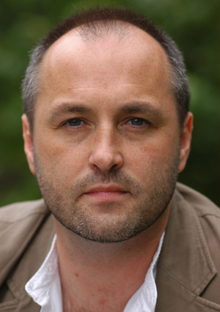A Conversation with Colum McCann

Photo: Matt Valentine
In his National Book Award winning novel Let the Great World Spin, Colum McCann plays with the idea of balance, starting with Philippe Petit's 1974 glorious tightrope walk between the Twin Towers, and in stories of ordinary New Yorkers tied, however tangentially, to that event. Our reviewer called the novel "an act of pure bravado."
Balance isn't as easy to achieve in life, he admits: "It's bizarre channeling a 38-year-old grandmother who's a prostitute, and then suddenly a note from my kid slips under my door that says: Daddy, let's go play soccer." Colum took time, before heading out to a Mets game with his three children, to speak with us about his reconnaissance walks on Park Avenue, attempts to track down '70s hookers (in a public library), and the reason he wants Bill Gates to read this book.
O: What made you want to write about Philippe Petit's walk? Balance isn't as easy to achieve in life, he admits: "It's bizarre channeling a 38-year-old grandmother who's a prostitute, and then suddenly a note from my kid slips under my door that says: Daddy, let's go play soccer." Colum took time, before heading out to a Mets game with his three children, to speak with us about his reconnaissance walks on Park Avenue, attempts to track down '70s hookers (in a public library), and the reason he wants Bill Gates to read this book.
Colum: It's such a glorious human image, almost overused at this stage, but people are still thrilled by the idea of a man walking a quarter of a mile in the sky, back and forth eight times on a quarter-inch rope. I could watch the documentary Man on Wire over and over again. There have been books: Petit's own and a children's book. There was a play that didn't do very well, and a company out in Hollywood is doing a reanimation of the walk. In many ways, a whole industry has grown up around the walk.
O: When did you start thinking about it?
Colum: Petit's been in my head since 9/11, but I had to put him off for about three years because I was in the middle of another novel, called Zola. When I got back to it, the idea for the story changed. I became interested in the people who might have seen the event—the you and the me—people who would have been there at the time and those of us might go down to the World Trade Center site now, and stare up in the air imagining him, a sort of ghost up there.
O: What was the story going to be originally?
Colum: I thought it would be very specifically about the walk—a small, controlled novel—and I wanted to mess with the idea of history and have him fall...
O: Oof.
Colum: I then realized exactly what you just said. The further away we got from 9/11, the more I wanted to find some way to recover. I wanted to talk about the more anonymous corners of the city, because I think it's very important that not all of that anger was turned to revenge. I don't want to get too yippee and "out there," but in the face of crime and torment, the good news is that we can heal. I was interested in the idea of redemption.
O: So you looked to the 1970s for redemption for something that happened twenty-five years later. How does that work?
Colum: Yeah, kind of contradictory, isn't it? But if we want to find out who we are, we have to look at who we were. The book was set in the '70s because that's when the walk took place, but I also like writing about that time when we had excess before excess became tragic with AIDS and drugs coming home to roost. We were wild without being overly romantic like in the mid-sixties, which was a time of dreaming.



